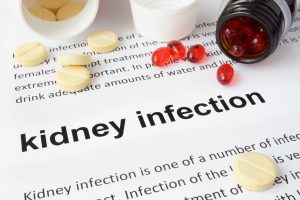Pyelonephritis (kidney infection) caused by E. coli bacteria can increase the risk of kidney damage and sepsis. Pyelonephritis is a type of urinary tract infection (UTI) typically caused by E. coli bacteria. The bacteria can spread from the bladder or the urethra to either one or both of the kidneys.
Serious complications can arise if a kidney infection is not treated promptly like kidney damage and sepsis (blood poisoning).
There are two main types of kidney infections: Uncomplicated kidney infection and complicated kidney infection. Uncomplicated kidney infection is when a person is healthy and the risk of complications is highly unlikely. In complicated kidney infections a person is more likely to suffer from complications possibly due to a co-existing medical condition or illness.
Kidney infection causes
As mentioned kidney infections can be caused by the bacteria E. coli. Other causes of kidney infections include:
- Weakened immune systems
- Pathogens spreading through the urethra to the kidneys
- Poor toilet hygiene such as using toilet paper used to wipe the anus
- Female physiology because female urethras are shorter
- Urinary catheter
- Kidney stones
- Enlarged prostate
- Sexually active females
Pyelonephritis (kidney infection) symptoms
Symptoms of a kidney infection include:
- Diarrhea
- Fever
- Nausea
- Uncontrollable shivering
- Vomiting
- Back pain
- Pain in the groin
- Pain in the side
- Symptoms worsen when urinating
If a bladder infection coincides with a kidney infection symptoms may also include:
- Bloody urine
- Cloudy urine
- Dysuria – pain or difficulty urinating
- Foul smelling urine
- Frequent urination
- Inability to urinate fully
- Pain in lower abdomen
Pyelonephritis (kidney infection) diagnosis and treatment
There are a slew of tests which a doctor can perform in order to properly diagnose a kidney infection including:
- Urinanalysis
- Urine culture
- Ultrasound
- CT scan
- X-ray imaging of the bladder and urethra when full and when urinating
- Digital rectal examination
- Dimercaptosuccinic acid (DMSA) scintigraphy
Kidney infections are commonly treated with antibiotics over the course of several weeks. Antibiotic treatment may first target common forms of bacteria but once urine culture comes back from the lab your doctor can prescribe more specific antibiotics based on the bacteria which is causing the infection.
If patients are severely ill intravenous fluids and hospital stays may be recommended along with antibiotic treatment in order to speed up recovery.
